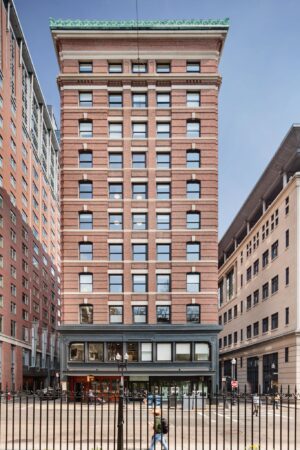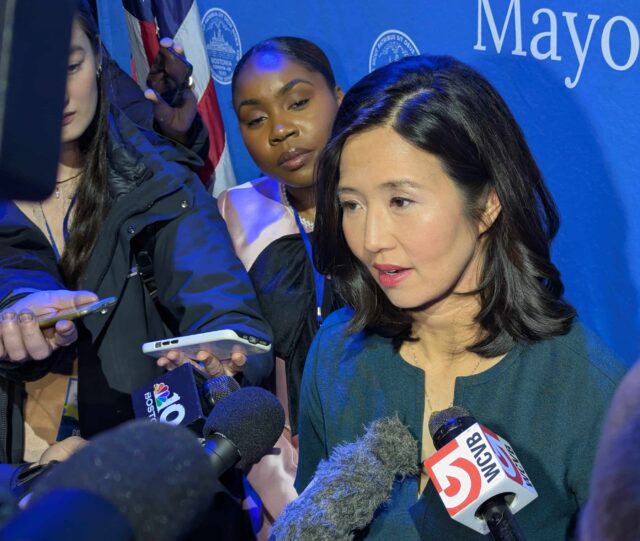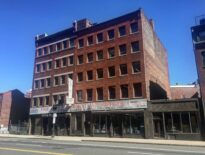
101 Tremont St. in 2016. Suffolk University won approval from city officials last year to convert the office building into a dorm housing up to 290 students. Photo courtesy of Newmark
Boston will launch its first-ever anti-displacement program and expand the scope of its office to residential conversion program, Mayor Michelle Wu said in setting the agenda during her annual State of the City address.
Local colleges will join commercial landlords in qualifying for the two-year-old tax incentive program designed to turn vacant buildings into housing, the mayor said, without offering further details.
“If you are looking to reactivate offices as dorms or workforce housing, we want to work with you,” Wu said in her address at Fenway Sports Group’s MGM Music Hall “We are leaving no stone unturned when it comes to building, preserving, and reimagining housing all over our city.”
The 14-month-old office conversion program has received 15 applications for 20 buildings and 760 housing units, according to the Boston Planning Department. Developers qualify for 75 percent tax abatements for 29 years.
Over 26 percent of downtown Boston’s office space is currently empty or available for sublease, and over 8 million square feet are vacant according to commercial brokerage Colliers.
The most recent city data, from 2023, shows over 38,000 undergraduate and graduate students live off-campus, mostly in Mission Hill, Allston, Brighton and the Fenway, “placing significant pressure on the rental markets of these neighborhoods,” according to the Mayor’s Office of Housing.
Several programs are intended to address the rising cost of living through new housing programs, including a $150 million partnership with local utilities to give residents incentives to install heat pumps and insulate aging dwellings.
Smaller and older apartment buildings tend to be energy-inefficient, relying on gas fired-boilers. But many apartment landlords have little incentive to update building systems, because they typically pass along utility bills to tenants, city officials have stated in recent green building studies.
Last fall, a Boston Foundation report determined that decarbonizing small and medium-sized buildings comes with a hefty price tag: $21,000 to $58,000 per unit, even after receiving MassSave and federal incentives.
The study focused on more than 70,000 residential buildings in Boston, and concluded up to $200 million is needed to fill the funding gap from new sources.
The program announced by Wu on Wednesday seeks to install 5,000 heat pumps over the next five years at buildings with 15 housing units, and small commercial and nonprofit spaces under 20,000 square feet. The $150 million cost will be shared between the city and utilities Eversource and National Grid.

Mayor Michelle Wu speaks to reporters during a press conference after her 2025 State of the City speech at MGM Music Hall on March 19, 2025. Photo by James Sanna | Banker & Tradesman Staff
Anti-Displacement Program Coming
An anti-displacement program will be announced Thursday, continuing a recent emphasis by the administration on preserving existing lower-rent housing through partnerships with nonprofits and land trusts.
Wu’s support for a rent stabilization law in Boston has been unable to gain the needed approval of the state Legislature, prompting the administration to focus on other strategies to control housing prices.
The administration already has provided funding to nonprofit developers willing to place long-term affordability restrictions, rather than letting them be acquired by for-profit developers. The Acquisition Opportunity program has provided forgivable loans to groups such as the Boston Neighborhood Community Land Trust to acquire apartment buildings, sparing existing tenants rent increases.
The program has retained 700 units that could have been sold to speculative developers, Wu said.
In Somerville, a task force last month recommended a series of anti-displacement strategies for commercial and residential properties.
The group recommended apartment landlords be required to notify tenants as soon as they list the property for sale, to give nonprofits and affordable housing groups a chance to bid on the property. The report also called for increased relocation payments, ranging from $14,000 to $18,000, for apartment renters displaced by condominium conversions.
Wu’s only challenger in the mayoral race to date, former Boston Boys and Girls Club CEO Josh Kraft, has made the downturn in housing construction a major theme in his campaign.
Kraft blames Wu for discouraging new development by imposing higher requirements for income-restricted units in multifamily projects. He has proposed rolling back the minimum percentage of affordable units in approved but unbuilt projects, with the goal of helping developers obtain financing.
Wu said the administration is adding a business recruitment office to fill commercial vacancies and revitalize the downtown business district.






